关于二战的英语小作文
二战自我介绍英语作文
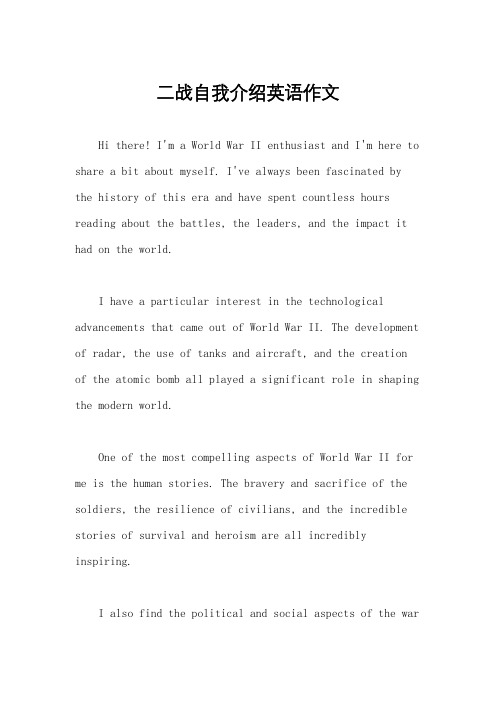
二战自我介绍英语作文Hi there! I'm a World War II enthusiast and I'm here to share a bit about myself. I've always been fascinated by the history of this era and have spent countless hours reading about the battles, the leaders, and the impact it had on the world.I have a particular interest in the technological advancements that came out of World War II. The development of radar, the use of tanks and aircraft, and the creation of the atomic bomb all played a significant role in shaping the modern world.One of the most compelling aspects of World War II for me is the human stories. The bravery and sacrifice of the soldiers, the resilience of civilians, and the incredible stories of survival and heroism are all incredibly inspiring.I also find the political and social aspects of the warto be fascinating. The rise of dictators, the alliances formed between countries, and the impact on the home front all provide a rich tapestry of stories and lessons to be learned.In conclusion, World War II is a period of history that continues to captivate me. The sheer scale of the conflict, the diverse range of experiences, and the lasting impact it has had on the world make it a topic that I will continue to study and learn from for years to come.。
有关二战德国的英语作文
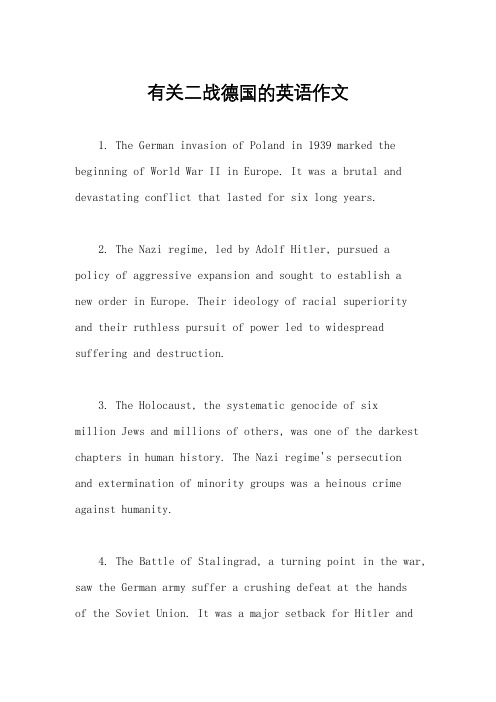
有关二战德国的英语作文1. The German invasion of Poland in 1939 marked the beginning of World War II in Europe. It was a brutal and devastating conflict that lasted for six long years.2. The Nazi regime, led by Adolf Hitler, pursued apolicy of aggressive expansion and sought to establish anew order in Europe. Their ideology of racial superiority and their ruthless pursuit of power led to widespread suffering and destruction.3. The Holocaust, the systematic genocide of sixmillion Jews and millions of others, was one of the darkest chapters in human history. The Nazi regime's persecutionand extermination of minority groups was a heinous crime against humanity.4. The Battle of Stalingrad, a turning point in the war, saw the German army suffer a crushing defeat at the handsof the Soviet Union. It was a major setback for Hitler andhis forces, and marked the beginning of the end for Nazi Germany.5. The Allied forces, including the United States, the United Kingdom, and the Soviet Union, eventually emerged victorious after years of hard-fought battles and sacrifices. The defeat of Nazi Germany in 1945 brought an end to the war in Europe.6. The legacy of World War II continues to shape the world today. The lessons learned from the horrors of thewar have led to a renewed commitment to peace, human rights, and the prevention of genocide. The memory of the warserves as a reminder of the importance of standing up against tyranny and injustice.。
用英文写一篇关于二战的作文

用英文写一篇关于二战的作文The Impact of World War II on Global History.World War II was one of the most significant and devastating events in human history. Spanning from 1939 to 1945, it involved most of the world's nations and resulted in unprecedented loss of life and destruction. The war was a complex interplay of political, economic, social, and technological factors that shaped its outcome and had profound impacts on the global landscape.Origins of the War.The seeds of World War II were sown in the aftermath of World War I. The Treaty of Versailles, which ended the Great War, was highly unpopular in Germany, leading to resentment and a desire for revenge. This resentment was exacerbated by the economic depression that followed the war, which left many Germans unemployed and disillusioned. The rise of dictators like Adolf Hitler in Germany andBenito Mussolini in Italy capitalized on this discontent, promising to restore national pride and prosperity.Hitler's aggressive foreign policy, including the annexation of Austria and the Sudetenland region of Czechoslovakia, led to a series of diplomatic crises.Britain and France, seeking to appease Hitler, initially accommodated his demands. However, when Hitler invaded Poland in September 1939, Britain and France declared waron Germany, marking the beginning of World War II.The War in Europe.The war in Europe began with a blitzkrieg attack by Germany on Poland, followed by the rapid conquest of Norway, Denmark, France, and other countries. The Battle of Britain, in which Germany attempted to gain air superiority over Britain, was a crucial turning point. The Royal Air Force successfully defended Britain from a Luftwaffe invasion,and Hitler's plans for a quick victory in the West were dashed.The war in Europe reached its climax with the invasion of the Soviet Union by Germany in June 1941. This marked the beginning of a long and brutal conflict between the two superpowers, with millions of casualties on both sides. The Soviet Union, despite initial reverses, mounted a valiant defense and ultimately emerged victorious, with the help of the Allied invasion of Normandy in June 1944.The Pacific War.Meanwhile, in the Pacific, Japan had embarked on a campaign of aggression, attacking Pearl Harbor in December 1941 and seizing vast territories in Asia and the Pacific. The United States, a neutral power until then, responded by declaring war on Japan and entering the conflict.The Pacific War was a grueling conflict of attrition, with the Allies gradually gaining the upper hand through superior technology and industrial production. The Battle of Midway, in which the U.S. Navy destroyed a large part of the Japanese fleet, was a crucial turning point. The Allies eventually invaded Japan in August 1945, following theatomic bombings of Hiroshima and Nagasaki, forcing Japan's surrender.The End of the War.With the surrender of Japan on August 14, 1945, and the defeat of Germany on May 8, 1945, World War II came to an end. The Allies had emerged victorious, but the cost had been staggering: millions of lives lost, cities destroyed, and economies in tatters.The Impact of the War.The impact of World War II was felt worldwide. The war had permanently altered the geopolitical landscape, with the emergence of the United States as a global superpower and the decline of European imperialism. The war also marked a turning point in technology, with the development of radar, jet engines, atomic weapons, and other advancements that would shape the future.The war had profound effects on culture and society. Itled to a reevaluation of values and priorities, with a focus on peace, social justice, and international cooperation. The Universal Declaration of Human Rights, adopted in 1948, was a testament to this newfound commitment to human rights and freedoms.Conclusion.World War II was a watershed moment in human history. It was a tragic reminder of the costs of conflict and aggression, but it also spawned new ideas and institutions that would shape the postwar world. The lessons of World War II are still relevant today, as we face new challenges and conflicts in a globalized world. It is important that we remember the horrors of the past and strive to build a more peaceful and inclusive future.。
二战的意义及反思教训英语作文

二战的意义及反思教训英语作文World War II was a pivotal moment in human history, a conflict that reshaped the global landscape and left an indeluring impact on the world. The sheer scale of the war, the immense loss of life, and the profound social and political changes it triggered make it a subject of enduring fascination and study. In this essay, we will explore the significance of World War II and the critical lessons we must take away from this monumental event.At its core, World War II was a struggle between the forces of democracy and authoritarianism, a clash of ideologies that threatened to plunge the world into darkness. The rise of totalitarian regimes, such as Nazi Germany and Imperial Japan, challenged the very foundations of freedom and human rights. Their aggressive expansionism, coupled with a disregard for international law and the sanctity of human life, sparked a global conflagration that would ultimately determine the fate of nations.One of the most significant aspects of World War II was its truly global nature. Unlike previous conflicts, which were often confined tospecific regions, this war spanned multiple continents and involved the participation of nations from around the world. The battlefields stretched from the shores of Europe to the Pacific islands, with each theater of war presenting its own unique challenges and requiring the mobilization of vast resources and manpower.The sheer scale of the war's devastation is staggering. Estimates suggest that over 70 million people lost their lives during the conflict, making it the deadliest war in human history. The horrors of the Holocaust, the systematic genocide of the Jewish people and other minority groups, stand as a sobering reminder of the depths of human cruelty and the importance of vigilance against such atrocities.Beyond the immense human toll, World War II also had profound social and political consequences. The war led to the collapse of colonial empires, paving the way for the emergence of new nation-states and the rise of independent movements. The post-war period saw the establishment of the United Nations, an organization dedicated to fostering international cooperation and preventing future conflicts.Moreover, the war accelerated the development of new technologies, from the advent of nuclear weapons to advancements in aviation, communication, and medical research. These technologicalbreakthroughs would go on to shape the world we live in today, for better or for worse.One of the most crucial lessons we must take away from World War II is the importance of collective action and international cooperation in the face of global threats. The war demonstrated the devastating consequences of unchecked aggression and the failure of appeasement policies. It underscored the need for nations to stand united, to defend the principles of democracy, and to uphold the rule of law.Additionally, the war highlighted the dangers of unchecked nationalism, racial hatred, and the scapegoating of minority groups. The horrors of the Holocaust serve as a stark reminder of the consequences of such divisive ideologies and the importance of promoting tolerance, diversity, and respect for human rights.Furthermore, World War II taught us the value of resilience, determination, and the human spirit in the face of adversity. The stories of courage, sacrifice, and perseverance displayed by soldiers, civilians, and resistance fighters alike serve as a testament to the indomitable nature of the human will.As we reflect on the legacy of World War II, we must also acknowledge the ongoing challenges and threats to global peaceand security. The proliferation of nuclear weapons, the rise of new authoritarian regimes, and the increasing complexity of geopolitical tensions all serve as reminders that the lessons of the past must be heeded and applied to the present and future.In conclusion, World War II stands as a pivotal moment in human history, a conflict that reshaped the world and left an indelible mark on the collective consciousness of humanity. The significance of this war lies not only in its scale and devastation but also in the critical lessons it has bequeathed to us. As we navigate the challenges of the 21st century, it is incumbent upon us to heed the lessons of the past, to promote international cooperation, to defend democracy and human rights, and to strive for a more just and peaceful world. Only then can we truly honor the sacrifices of those who fought and perished in the crucible of World War II.。
关于二战的英语作文
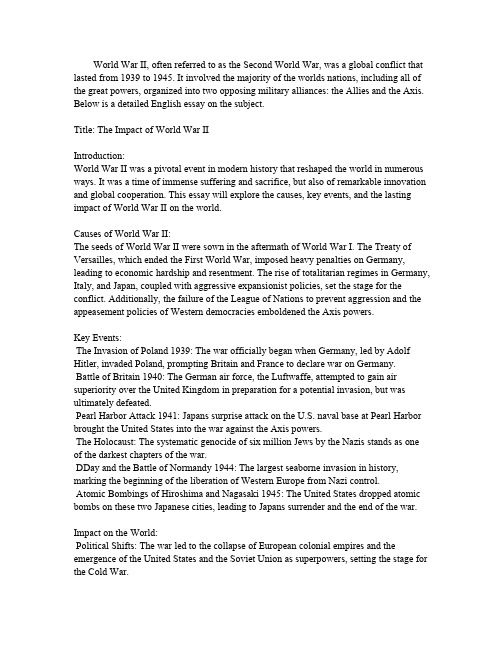
World War II,often referred to as the Second World War,was a global conflict that lasted from1939to1945.It involved the majority of the worlds nations,including all of the great powers,organized into two opposing military alliances:the Allies and the Axis. Below is a detailed English essay on the subject.Title:The Impact of World War IIIntroduction:World War II was a pivotal event in modern history that reshaped the world in numerous ways.It was a time of immense suffering and sacrifice,but also of remarkable innovation and global cooperation.This essay will explore the causes,key events,and the lasting impact of World War II on the world.Causes of World War II:The seeds of World War II were sown in the aftermath of World War I.The Treaty of Versailles,which ended the First World War,imposed heavy penalties on Germany, leading to economic hardship and resentment.The rise of totalitarian regimes in Germany, Italy,and Japan,coupled with aggressive expansionist policies,set the stage for the conflict.Additionally,the failure of the League of Nations to prevent aggression and the appeasement policies of Western democracies emboldened the Axis powers.Key Events:The Invasion of Poland1939:The war officially began when Germany,led by Adolf Hitler,invaded Poland,prompting Britain and France to declare war on Germany. Battle of Britain1940:The German air force,the Luftwaffe,attempted to gain air superiority over the United Kingdom in preparation for a potential invasion,but was ultimately defeated.Pearl Harbor Attack1941:Japans surprise attack on the U.S.naval base at Pearl Harbor brought the United States into the war against the Axis powers.The Holocaust:The systematic genocide of six million Jews by the Nazis stands as one of the darkest chapters of the war.DDay and the Battle of Normandy1944:The largest seaborne invasion in history, marking the beginning of the liberation of Western Europe from Nazi control.Atomic Bombings of Hiroshima and Nagasaki1945:The United States dropped atomic bombs on these two Japanese cities,leading to Japans surrender and the end of the war. Impact on the World:Political Shifts:The war led to the collapse of European colonial empires and the emergence of the United States and the Soviet Union as superpowers,setting the stage for the Cold War.Economic Transformation:The United States experienced an economic boom,while Europe was rebuilt through the Marshall Plan,leading to a period of unprecedented growth known as the Golden Age of Capitalism.Cultural Changes:The war had profound effects on art,literature,and film,often reflecting the trauma and heroism of the conflict.Technological Advancements:Innovations in areas such as aviation,computing,and nuclear technology were spurred by the war,shaping the technological landscape of the latter half of the20th century.Conclusion:World War II was a complex and devastating event that had profound and lasting effects on the global landscape.It brought about significant political,economic,and social changes,many of which continue to influence our world today.The lessons of the war, particularly the importance of international cooperation and the need to prevent the rise of totalitarian regimes,remain relevant as we continue to navigate the complexities of the modern world.。
关于二战的作文800字
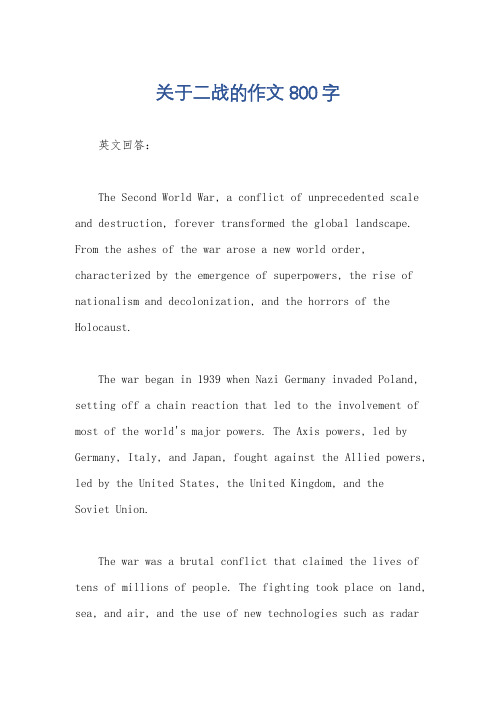
关于二战的作文800字英文回答:The Second World War, a conflict of unprecedented scale and destruction, forever transformed the global landscape. From the ashes of the war arose a new world order, characterized by the emergence of superpowers, the rise of nationalism and decolonization, and the horrors of the Holocaust.The war began in 1939 when Nazi Germany invaded Poland, setting off a chain reaction that led to the involvement of most of the world's major powers. The Axis powers, led by Germany, Italy, and Japan, fought against the Allied powers, led by the United States, the United Kingdom, and theSoviet Union.The war was a brutal conflict that claimed the lives of tens of millions of people. The fighting took place on land, sea, and air, and the use of new technologies such as radarand jet aircraft led to unprecedented levels of destruction. The war also witnessed the Holocaust, the systematic genocide of six million Jews and millions of other victims by the Nazis.The Allies emerged victorious from the war in 1945. Germany and Japan were defeated, and the Axis powers were dismantled. The war had a profound impact on the political, economic, and social landscape of the world. It led to the establishment of the United Nations, an international organization dedicated to maintaining peace and security. The war also ushered in the Cold War, a decades-longstruggle for global supremacy between the United States and the Soviet Union.The legacy of the Second World War is complex and controversial. Some see the war as a necessary evil that defeated fascism and Nazism. Others argue that the war wasa senseless tragedy that caused untold suffering. Regardless of one's perspective, the Second World War remains one of the most significant events in human history.中文回答:第二次世界大战是一场空前规模和破坏性的战争,它永远地改变了世界格局。
二战造成的人类损失英语作文
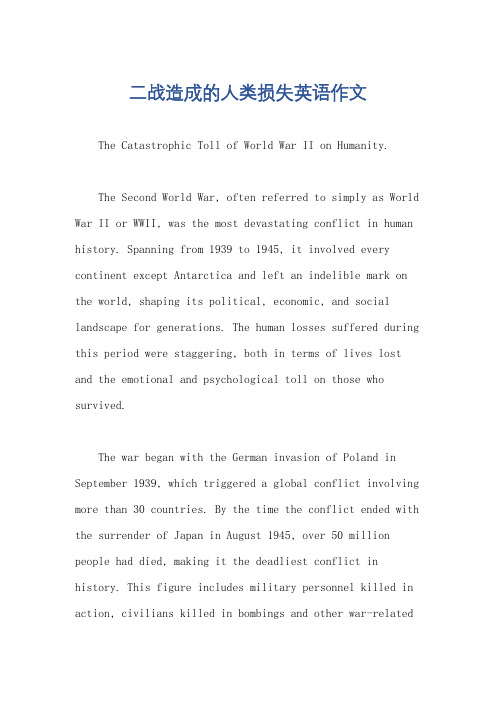
二战造成的人类损失英语作文The Catastrophic Toll of World War II on Humanity.The Second World War, often referred to simply as World War II or WWII, was the most devastating conflict in human history. Spanning from 1939 to 1945, it involved every continent except Antarctica and left an indelible mark on the world, shaping its political, economic, and social landscape for generations. The human losses suffered during this period were staggering, both in terms of lives lost and the emotional and psychological toll on those who survived.The war began with the German invasion of Poland in September 1939, which triggered a global conflict involving more than 30 countries. By the time the conflict ended with the surrender of Japan in August 1945, over 50 million people had died, making it the deadliest conflict in history. This figure includes military personnel killed in action, civilians killed in bombings and other war-relatedviolence, and those who died from diseases and starvation caused by the war.The loss of life was particularly devastating in some regions. In Europe, the Nazi concentration camps claimed the lives of millions of Jews, Poles, Soviets, and others deemed enemy aliens. The bombing of cities like Dresden and Hiroshima by Allied forces also resulted in the deaths of tens of thousands of civilians. The war in the Pacific was equally brutal, with the Japanese Empire committing atrocities such as the massacre at Nanking and the use of slave labor.Beyond the immediate loss of life, the war had profound effects on the survivors. Millions were left homeless and traumatized by their experiences. Post-traumatic stress disorder (PTSD) and other mental health issues were common among war veterans, who often struggled to cope with the memories of violence and loss. Women and children, who often bore the brunt of war's atrocities, faced even greater challenges in the post-war era, as they attempted to rebuild their lives in the wake of devastating loss.The economic impact of the war was also devastating. Entire countries were left in ruins, with infrastructure destroyed and economies in tatters. The war effort had drained national resources, and the post-war period saw a scramble for recovery and reconstruction. This process was often slow and painful, as countries struggled to rebuild their industries, infrastructure, and social services.The legacy of World War II is felt today in many ways. The conflicts and tensions that preceded the war are still relevant, serving as reminders of the importance of international cooperation and the dangers of nationalistic fervor. The war's atrocities have influenced international law and human rights norms, leading to the establishment of institutions like the United Nations and the International Criminal Court to prevent and prosecute such atrocities in the future.In conclusion, the human losses of World War II were immense and far-reaching. The death toll was staggering, and the emotional and psychological toll on survivors wasprofound. The war's legacy continues to shape the world today, serving as a constant reminder of the costs of conflict and the importance of peace. As we remember those who lost their lives during this tragic period, it is crucial that we learn from its lessons and strive to build a more peaceful and just world.。
关于二战人物的英语作文

关于二战人物的英语作文The Second World War was a pivotal moment in history, shaping the world as we know it today. Amidst the chaos and destruction, there emerged figures whose courage and leadership left an indelible mark on humanity.One such figure was Winston Churchill, the British Prime Minister whose oratory skills and unwavering resolve inspired a nation to stand against tyranny. His speeches, filled with determination, became a beacon of hope in the darkest of times.On the other side of the conflict, figures like Anne Frank represented the resilience of the human spirit. Her diary, a testament to the horrors of the Holocaust, also captured the essence of hope and the desire for a peaceful world.Another notable figure was Joseph Stalin, the Soviet leader whose strategic decisions and leadership played a crucial role in the defeat of Nazi Germany. His influence, however, was a double-edged sword, as it came with a heavy cost to his own people.The war also saw the rise of military heroes like General George S. Patton, whose tactical genius and aggressive approach on the battlefield earned him both admiration and controversy.The stories of these individuals are not just tales of war; they are narratives of courage, sacrifice, and the complexities of human nature. Each played a unique role in a global conflict that changed the course of history, and their legacies continue to influence us today.In reflecting on these figures, we are reminded of the importance of leadership, the power of the written word, and the indomitable spirit of those who faced unimaginable adversity. Their stories serve as lessons for future generations, urging us to learn from the past and strive for a more peaceful and just world.。
- 1、下载文档前请自行甄别文档内容的完整性,平台不提供额外的编辑、内容补充、找答案等附加服务。
- 2、"仅部分预览"的文档,不可在线预览部分如存在完整性等问题,可反馈申请退款(可完整预览的文档不适用该条件!)。
- 3、如文档侵犯您的权益,请联系客服反馈,我们会尽快为您处理(人工客服工作时间:9:00-18:30)。
关于二战的英语小作文
英文回答:
During World War II, many countries were involved in the conflict, including the United States, Germany, Japan, and the Soviet Union. The war lasted from 1939 to 1945 and had a profound impact on the world. The war was fought on multiple fronts, including in Europe, Asia, Africa, and the Pacific.
One of the most significant events of World War II was the D-Day invasion, when Allied forces landed on the beaches of Normandy in France on June 6, 1944. This marked the beginning of the end for the Axis powers, as the Allies were able to gain a foothold in Europe and eventually push the Germans back.
Another major event of the war was the bombing of Hiroshima and Nagasaki in Japan in August 1945. The dropping of atomic bombs on these cities by the United
States led to the end of the war and the surrender of Japan.
World War II also saw the rise of powerful leaders such as Adolf Hitler, Winston Churchill, Joseph Stalin, and Franklin D. Roosevelt. These leaders played key roles in shaping the outcome of the war.
Overall, World War II was a devastating conflict that resulted in millions of deaths and widespread destruction. However, it also led to important changes in the world,
such as the establishment of the United Nations and the beginning of the Cold War.
中文回答:
二战期间,许多国家参与了这场冲突,包括美国、德国、日本
和苏联。
这场战争持续了从1939年到1945年,对世界产生了深远
影响。
战争在欧洲、亚洲、非洲和太平洋等多个战线上进行。
二战中最重要的事件之一是诺曼底登陆,盟军于1944年6月6
日在法国诺曼底的海滩上登陆。
这标志着轴心国的覆灭开始,因为
盟军能够在欧洲站稳脚跟,并最终将德军赶回。
战争的另一个重大事件是1945年8月美国对日本广岛和长崎进
行的原子弹轰炸。
美国投下原子弹导致了战争的结束和日本的投降。
二战还见证了希特勒、丘吉尔、斯大林和罗斯福等强大领导人
的崛起。
这些领导人在塑造战争结果方面发挥了关键作用。
总的来说,二战是一场毁灭性的冲突,导致了数百万人死亡和
广泛的破坏。
然而,它也带来了世界上重要的变化,比如建立联合
国和冷战的开始。
